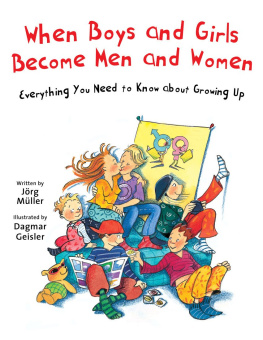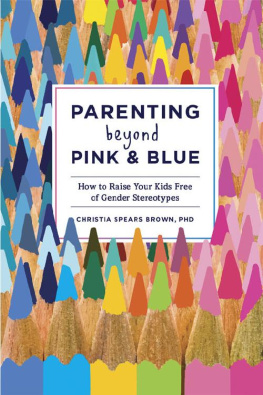How to Teach Boys to be Fair to Girls
DEI for Parents
Trish Allison
Published by DEI for Parents, 2022.
While every precaution has been taken in the preparation of this book, the publisher assumes no responsibility for errors or omissions, or for damages resulting from the use of the information contained herein.
HOW TO TEACH BOYS TO BE FAIR TO GIRLS
First edition. October 15, 2022.
Copyright 2022 Trish Allison.
ISBN: 978-1393392033
Written by Trish Allison.
10 9 8 7 6 5 4 3 2 1
Also by Trish Allison
DEI for Parents
How to Respond to Disability Curiosity from Kids
How to Tell Kids the True Story of Native Americans
How to Explain Immigration to Kids
How to Explain Transgenderism to Kids Using Simple Words
How to Talk to Kids About Poverty and Homelessness
How to Teach Boys to be Fair to Girls
How to Teach Kids Manners for ANY Religion
How to Teach Girls They're Just as Worthy as Boys
How to Teach Kids to Interact with Older People
How to Teach Kids to be Kind to Gay People
Watch for more at Trish Allisons site.
"We have to teach our boys the rules of equality and respect so that as they grow up, gender equality becomes a natural way of life."
- Beyonce
W hat we grow up learning and experiencing affects us our entire lives, impacts how we think and behave, and informs our ingrained decision-making skills.
If parents can raise an entire generation of boys with a more accurate understanding of girls' potential, we can really move the gender-justice needle in a lot of areas.
The most effective way to move the needle is to ensure that the values our boys are observing at home enforce concepts like equality and empathy, not outdated gender stereotypes.
The way you talk to your partner, divide family chores, even small things like who empties the dishwasher - make lasting impressions on how your boy considers gender justice.
It takes time to acquire a habit and parents need to be patient with their children. Keep repeating these habits every day so the child inculcates it more promptly. Sometimes, parents are not aware what habits they should teach their children.
Yes, he's influenced by his peers and his teachers at school, but ultimately, the values that he'll carry with him throughout his life are learned at home.
This guidebook provides practical tips for driving home (pun intended!) some of the pillars of a sustainable gender-equality foundation.
By nurturing his emotional IQ, fostering his empathy skills, explaining false gender stereotypes, providing him with positive male role models, and staying close to him as he grows, you can give your boy what he needs to become a confident, empathic person and an exceptional man.
Here are a few things to keep in mind as you're reading this guidebook:
- The tips are written for parents of boys in elementary school but theres a wide spectrum of maturity at every age. Some 6-year-olds are mature way beyond their years and some 10-year-olds are learning at a different pace than their peers. That said, feel free to adjust tip content to fit your boy's stage of development.
- None of the steps are intended to be completed on a single, dictatorial occasion. The intent is to communicate the values described in this guidebook on a casual basis over a period of time.
- Tips apply to all combinations of the modern family.
- The chapters themselves are not organized in a straight line. That is, they're intended as a non-linear collection of building blocks to increase boys gender-equality awareness. For example, you might need to help your boy find a suitable male role model (later chapter) before you're ready to explain 'consent' (early chapter). That's perfectly fine. There's no prescribed order.
- The content inside each chapter is linear; the step-by-step instructions are meant to be read in order. For example, when you're helping your boy understand consent, so he remembers, it's crucial that you review basic respect together before you discuss boundaries.
- While theres no one-size-fits-all solution for raising equality-minded kids, this guidebook provides suggestions for scenarios that you can tailor to fit your own situation. The ultimate goal is to help you raise compassionate, non-biased, successful humans.
- Many of the tips assume that you and your boy already share a fairly solid foundation of mutual communication. The tips are doable without this foundation, but they'll be much harder to implement successfully without it.
- Kids learn much more efficiently when they feel like they've arrived at a concept on their own instead of believing something because that's what they've been told to believe. Help your boy reach his own conclusions by providing 'breadcrumbs' that lead him to discover values using his own reasoning skills. For example, instead of telling your boy he needs to be more sensitive to the needs of others, use the suggestions in the How to Cultivate Empathy chapter to lead him toward discovering his own empathy skills.
- It's so important to praise kids when they do something positive. Be specific with your praise and look your boy in the eyes. Your approval means more to him than you think.
Finally, meaningful engagement with men and boys is increasingly recognized as a critical step to advancing gender equality. But engaging the male population is not an end in itself.
Rather, it's about integrating efforts, non-segregated by boys vs. girls, to accomplish a common goal. Achieving this kind of synergy is what the gender-equality movement is all about in the first place.
Chapter 1
Learn His True Opinion of Gender Equality
J ust as much as girls , boys have a significant role to play in the movement toward gender equality. We need to guide them toward a healthy understanding of their part in movement progress.
But before we can do that, we need an accurate understanding of how boys truly feel about gender justice and how they think it affects them. To effectively engage them in the big-picture gender-equality conversation, we need to get them talking, listen to their words, and keep them involved in an ongoing two-way conversation.
The steps in this chapter are meant to help you assess your boys understanding of womens rights. Maybe hes already well-versed in all aspects of current and past movements. Or maybe he knows very little about it and youre starting with a blank slate.
Either way, youll never know until you get him talking about it and really listen to his opinion.
















